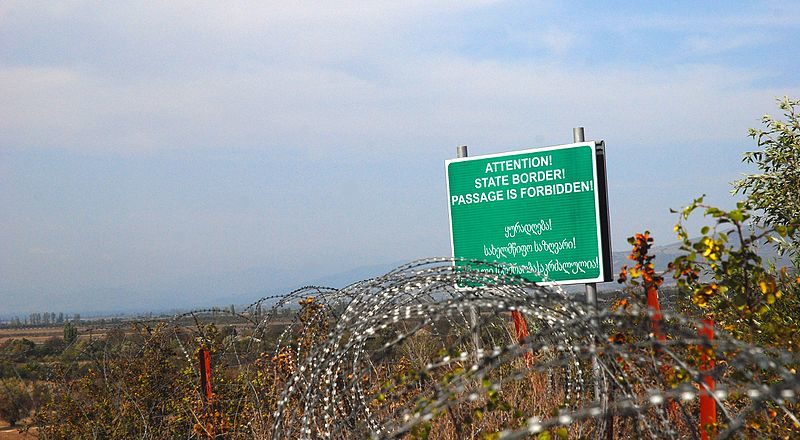A nation must think before it acts.
When Russia annexed Crimea in 2014, the consequences were harsh for the invader—global outrage over and condemnation of the Kremlin’s actions were quickly followed by the application of Western sanctions against Moscow. Although these actions did not stop President Vladimir Putin from further pursuing his expansionist policies, the Ukraine crisis did play an important role in the rapid deterioration of relations between Russia and the West. Russia’s actions inspired endless debates in Washington’s policy circles on whether or not the West entered into a “second Cold War” with Russia in 2014. But there is only so much punishment and outrage the West can direct towards a single aggressor country. There have always been smaller things—perhaps less strategically important (for the West), but equally as incriminating actions that Russia has taken against its neighbors—that have traditionally gone over without any consequences of significance for Russia. The case of Russia-Georgia relations is one such example.
Georgia—a small ancient empire in its own right—has had stressed relations with its northern neighbor for centuries. In 1801, the Russian empire broke its treaty of protection with Georgia when it annexed Georgia. Since then, Georgia has been engaged in multiple losing battles against Russia and later the Soviet Union. One leader who oversaw Russian oppression of Georgia was none other than Georgia’s own Joseph Stalin, better known in his home country as Ioseb Jughashvili.
When Georgia regained independence from Russia in 1991 after the USSR’s dissolution, two civil wars broke out within its borders, in Abkhazia and in South Ossetia. The newfound formal independence brought a different kind of dependence on Russia for Georgia, as Moscow helped broker ceasefires in Abkhazia and South Ossetia and placed permanent “peacekeeping forces” in the two breakaway, de-facto autonomous states. Since then, the presence of Russian military forces in the two territories has been a cause of endless violent incidents between Georgia and the two de-facto states. The most recent one occurred in 2008 and led to a war in South Ossetia, resulting in Russia bombing undisputed Georgian territories. While the West was integral in brokering a ceasefire and limiting the war to only five days, the damage done to the Georgian side proved irreparable. Notably, the Russian forces put up a barbed wire fence between Georgia and South Ossetia, an act that later became known as a “creeping occupation” due to the apparent fluidity of that border—the Russian forces have continuously moved the fence deeper into the undisputed Georgian territories. Russia has one very important reasons for this creeping occupation: the newly established “border” has left a part of a BP oil pipeline within Russia-controlled South Ossetian territory. The pipeline transits oil from Azerbaijan to the Black Sea through Georgia. The extended border makes it easy for Russia to sabotage the pipeline if and when it desires.
Some of the particular clauses of this Treaty of Alliance and Protection include South Ossetia’s handing over of all defense matters to Russia, including the defense of South Ossetia’s borders. Georgia is on the other side of that border. (The bullet points below represent select clauses of the 15-article treaty. The text has been translated from Russian and summarized by the author. These are not direct citations).
- The Russian Federation will ensure the defense and security of the Republic of south Ossetia, including the protection of the state border of the Republic of South Ossetia. The contracting parties will coordinate their efforts to counteract organized crime and will form joint information and coordination center that will unite their respective internal affairs bordies.
- The customs authorities of South Ossetia will integrate with the customs authorities of the Russian Federation.
- Citizens of one Contracting Party shall have the right to acquire a nationality of the other Contracting Party under the simplified procedure. The restrictions that the Russian Federation might pose on those who do not possess Russian citizenship will not apply to the citizens of South Ossetia
- The Republic of South Ossetia, with the support of the Russian Federation, shall gradually increase the average wages of employees of state and local government agencies to a level comparable with the level of remuneration of appropriate categories of workers in the North Caucasus Federal District of the Russian Federation.
- [Summary of multiple clauses] Russian citizens permanently residing in the territory of the Republic of South Ossetia are eligible for pensions, benefits, and other forms of social security at a level comparable with average level of pensions and other social security in the North Caucasus Federal District of the Russian Federation. Russian laws and regulations as well as benefits of the Russian social welfare system will apply to all those individuals living in South Ossetia who take Russian citizenship.
- The Russian Federation will assist in socio-economic development of the Republic of South Ossetia through investment programs.
The military dimension of this treaty is also all-encompassing. By the terms of the agreement, any aggression by foreign actors (including Georgia) against South Ossetia will be treated as an act of aggression against Russia, thus allowing Russia to wage possible future wars with Georgia.
The Georgian government, as well as Western governments, condemned the treaty and refuse to recognize South Ossetia’s independence or Russia’s absorption of the territory within the terms of the treaty. Yet, the reality of further Russian integration of South Ossetia continues to persist.
On March 14, Russia and South Ossetia made headlines again when President Vladimir Putin endorsed a Russian defense agreement to absorb the military forces of South Ossetia. The Russian Defense Ministry is now in talks with the South Ossetian de facto government in Tskhinvali to sign the agreement. This agreement is one of the many steps originally outlined in the Treaty on Alliance and Integration. Its terms would allow the Russian military to take over the South Ossetian military entirely. Those South Ossetian military personnel who hold Russian citizenship (who due to aggressive Russian passportization in South Ossetia now represent the majority of South Ossetia’s residents) will automatically become members of the Russian military. As a result, in a short period of time, South Ossetia will no longer have military forces of its own, leaving Russia entirely in charge of its defense, security, and military activities.
According to the Georgian Minister of Reconciliation and Civic Equality (the government office charged with reconciling relations between Georgia and its breakaway territories), Ketevan Tsikhelashvili, “there have been over 80 such so-called agreements signed between the two sides, which from the international law perspective carry no legitimacy, but are used by the Russian government to exert exclusive influence over every sphere [of South Ossetia] and to take steps towards ‘Russification’ and de facto annexation. This is absolutely unacceptable and we are calling on the international community to reinforce pressure on Russia to stop these actions.”
Since the treaty of Alliance and Integration was signed in 2015, the de facto government of South Ossetia has gone even further to demonstrate its aspiration to become a Russian territory by expressing its wishes to hold referenda on joining Russia and changing its name to “South Ossetia – Republic of Alania” (to resemble the Russian territory called “North Ossetia – Republic of Alania” and to unite with that republic). Tskhinvali is set to hold presidential elections in early April 2017, and, according to recent reports, the referendum on name change will be held on the same day.
The implementation of the Treaty of Alliance and Integration continues at the same time as Georgia makes efforts to integrate with the European Union. In a matter of weeks, the EU will begin to implement its visa liberalization policy with Georgia, which will allow visa-free travel for Georgian citizens to EU member states. Georgian policymakers hope that this new enticing benefit will convince more South Ossetians to obtain Georgian passports, but that is unlikely to happen in view of Russia’s practical annexation of South Ossetia.
*Editor’s note: 8.10.17: the original version of this article did not include the disclaimer regarding the fact that the bullet points represent select clauses of the 15-clause treaty which have been translated from Russian and summarized by the author.



